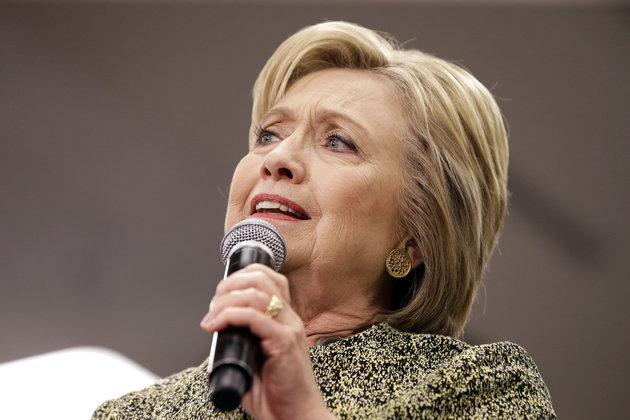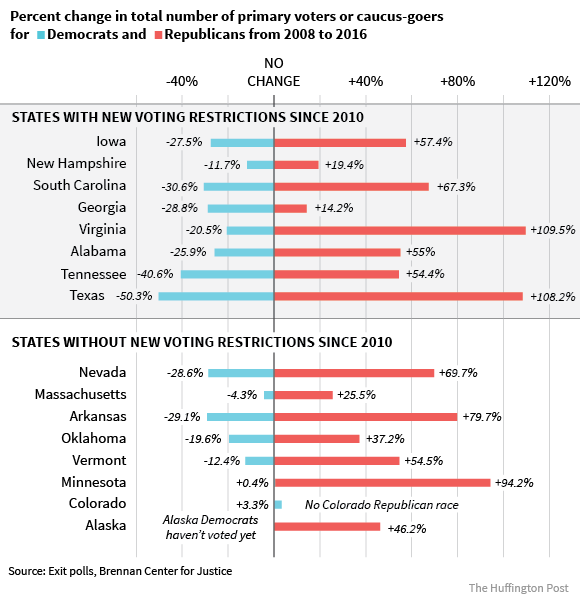
As voting rights advocates predicted loud and often, new voter ID laws seem to be hitting Democrats harder than Republicans.
GOP voter turnout in this year's presidential race is up 62 percent relative to 2008, the last time both parties had open contests. But Democratic voter turnout is down by 29 percent across all the primary and caucus states that have voted so far. In all but two states, fewer Democrats turned out to vote in 2016 than did in 2008.
Evidence suggests that new voting restrictions are at least a contributing factor.
Eight out of the 16 states that have held primaries or caucuses so far have implemented new voter ID or other restrictive voting laws since 2010. Democratic turnout has dropped 37 percent overall in those eight states, but just 13 percent in the states that didn't enact new voter restrictions. To put it another way, Democratic voter turnout was 285 percent worse in states with new voter ID laws.

There is also "mounting research" that shows voter ID laws "affect voter turnout and disproportionately affect certain types of voters," said Jennifer Clark, a lawyer for the Brennan Center's Democracy Program at New York University. African-Americans and Latinos are the most likely to be hurt by the new restrictions.
In other words, research suggests that voter ID laws suppress Democratic votes more than Republican ones. A recent study from the University of California, San Diego, looked at election behavior before and after states enacted stricter voter ID laws. It found that Democratic voter turnout dropped by 8.8 percent while Republican turnout fell by only 3.6 percent. The change was most apparent among minority voters.
Of course, other factors could also be at work. Engaged social media, competitive races and strong grass-roots-oriented campaigns all boost voter turnout. Eight years ago, when Democrats were faced with a crowded field and the chance to retake the White House after two terms with a Republican they didn't like, their primary season turnout was much higher than that of the other party.
This year, higher Republican turnout could stem from dissatisfaction with the current administration, a competitive field and a front-runner who's receiving a lot of media attention. Democrats might be in less haste to vote since most are satisfied with either Bernie Sanders or Hillary Clinton.
Voter ID rules "could have a large underlying role" in suppressing turnout this year but it's too early to know for sure, said UC San Diego professor Zoltan Hajnal, who worked on the study. "We can't assess it yet," he said.
On Tuesday in Texas, which has one of the toughest voter ID regimes, over half a million registered voters lacked the proper ID to cast a ballot due to new restrictions. The Nation reported on one Texas A&M University student who was turned away for not having the proper ID: Under the state's law, a student ID didn't qualify, but a gun permit would have worked.
Democratic voter turnout was down 50 percent in the Lone Star State from 2008, more than in any other early-voting state so far. Republican voter turnout in Texas grew by 108 percent, second only to Virginia, where it was up 109 percent.
Clark anticipates that Democrats will suffer from low voter turnout even more in November. "We will see this magnified in the general election," she said.


